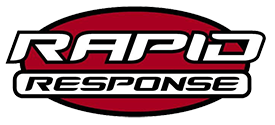Maintaining your truck is crucial to your success and safety as a truck driver. At Rapid Response, we understand the importance of keeping your rig in top shape to ensure you can deliver goods efficiently and without unexpected breakdowns. Regular maintenance not only extends the life of your vehicle but also improves fuel efficiency and ensures compliance with safety regulations. Here’s a comprehensive guide to help you keep your truck in optimal condition.
Regular Inspections: The Backbone of Maintenance
Performing regular inspections is the first step to maintaining your truck. This helps in identifying potential issues before they become major problems. Here are some key areas to focus on during inspections:
Tires
Check the tire pressure and tread depth regularly. Properly inflated tires improve fuel efficiency and handling. Worn-out tires can lead to blowouts, which are dangerous and can cause significant delays.
Brakes
Your truck’s braking system is vital for safety. Inspect the brake pads, rotors, and fluid levels regularly. Listen for any unusual sounds when braking, as these can indicate worn-out components that need replacement.
Lights and Electrical System
Ensure all lights, including headlights, brake lights, and indicators, are functioning correctly. A faulty electrical system can lead to various issues, from non-working lights to starting problems.
Fluid Levels
Regularly check and top off essential fluids like engine oil, coolant, brake fluid, and transmission fluid. Low or dirty fluids can lead to engine damage and other serious problems.
Preventive Maintenance: Staying Ahead of Problems
Preventive maintenance involves performing scheduled services and checks to prevent potential issues. Here’s a list of preventive maintenance tasks to keep your truck running smoothly:
Oil Changes
Regular oil changes are critical to keep your engine running smoothly. Follow the manufacturer’s recommendations for oil change intervals. Using high-quality oil can also help in improving the engine’s lifespan and performance.
Filter Replacements
Replace air, fuel, and oil filters as recommended. Clean filters ensure that the engine receives clean air and fuel, which helps in maintaining optimal performance and fuel efficiency.
Belt and Hose Inspections
Inspect belts and hoses for signs of wear and tear. Replace any that show cracks, fraying, or leaks. A broken belt or hose can lead to engine overheating or loss of power.
Battery Maintenance
Check the battery terminals for corrosion and ensure the battery is securely mounted. Test the battery regularly to ensure it holds a charge. A well-maintained battery ensures your truck starts reliably, especially in cold weather.
Seasonal Maintenance: Preparing for the Elements
Different seasons bring different challenges for truck maintenance. Here’s how to prepare your truck for various weather conditions:
Winter Maintenance
Winter conditions can be harsh on your truck. Prepare by checking the antifreeze levels, battery health, and tire condition. Consider using winter tires for better traction on icy roads. Ensure that the windshield washer fluid is rated for low temperatures to prevent freezing.
Summer Maintenance
Hot weather can cause engines to overheat. Check the coolant levels and ensure the radiator is in good condition. Inspect the air conditioning system to ensure it’s functioning correctly, as a comfortable cab can reduce driver fatigue.
Professional Maintenance Services: When to Seek Help
While regular inspections and preventive maintenance are tasks you can often handle yourself, some maintenance tasks require professional expertise. Here’s when you should seek help from a professional mechanic:
Complex Repairs
If you notice significant issues like transmission problems, engine knocks, or persistent warning lights on the dashboard, it’s time to visit a professional mechanic. These issues require specialized tools and knowledge to diagnose and repair.
Regular Servicing
Schedule regular servicing with a trusted mechanic to ensure all aspects of your truck are inspected and maintained. Professional servicing can help identify potential issues you might miss during routine checks.
Using Technology to Aid Maintenance
Technology can be a great ally in maintaining your truck. Modern trucks come equipped with various sensors and diagnostic systems that can alert you to potential issues. Here’s how technology can help:
Telematics Systems
Telematics systems can monitor your truck’s performance in real-time. They provide valuable data on fuel consumption, engine performance, and maintenance needs. This data can help you schedule maintenance tasks more efficiently and avoid unexpected breakdowns.
Diagnostic Tools
Investing in a good diagnostic tool can help you read error codes and identify issues quickly. These tools can connect to your truck’s onboard computer and provide detailed information about any problems.
Maintenance Apps
There are several apps available that can help you track maintenance schedules, record inspections, and set reminders for upcoming services. Using these apps ensures you never miss a maintenance task and keeps your truck in top condition.
The Role of Driving Habits in Maintenance
Your driving habits can significantly impact your truck’s condition and maintenance needs. Here are some tips to develop good driving habits:
Smooth Driving
Avoid sudden starts and stops, which can put extra stress on your truck’s engine, brakes, and suspension. Smooth driving reduces wear and tear and improves fuel efficiency.
Avoid Overloading
Overloading your truck can lead to excessive strain on the engine, brakes, and suspension. Ensure you adhere to the recommended load limits to prevent damage and maintain safety.
Monitor Gauges
Keep an eye on your truck’s gauges for signs of trouble. If you notice any abnormal readings, such as high engine temperature or low oil pressure, address the issue immediately to avoid serious damage.
Join Rapid Response for a Reliable Trucking Career
Maintaining your truck is essential for a successful and safe career in trucking. By following the tips and guidelines outlined in this post, you can keep your rig in top shape and ensure smooth operations on the road.
At Rapid Response, we prioritize the well-being of our drivers and their vehicles. We provide support, resources, and a community that values excellence in trucking. If you’re passionate about trucking and want to be part of a dedicated team, we invite you to join Rapid Response as a truck driver. Together, we can drive towards a brighter, more efficient future.

